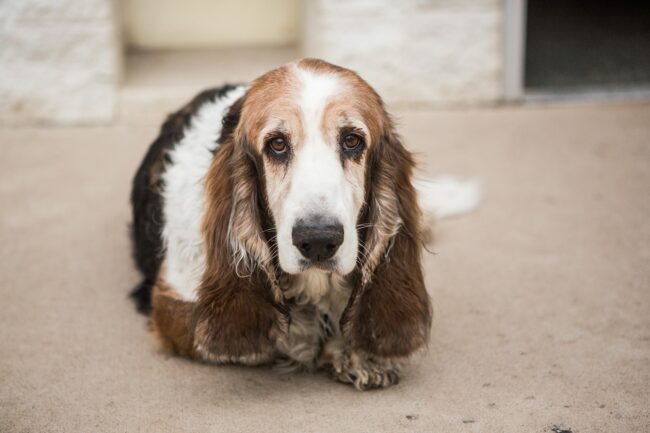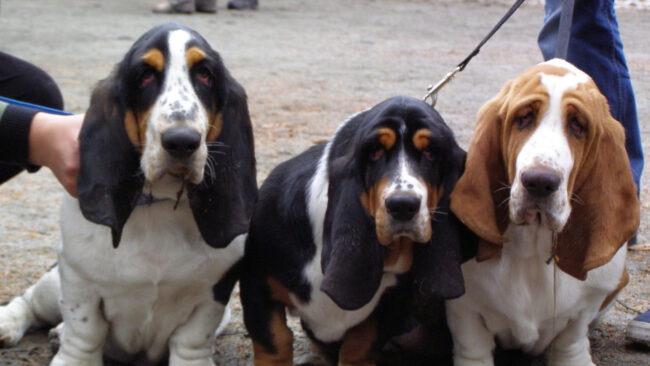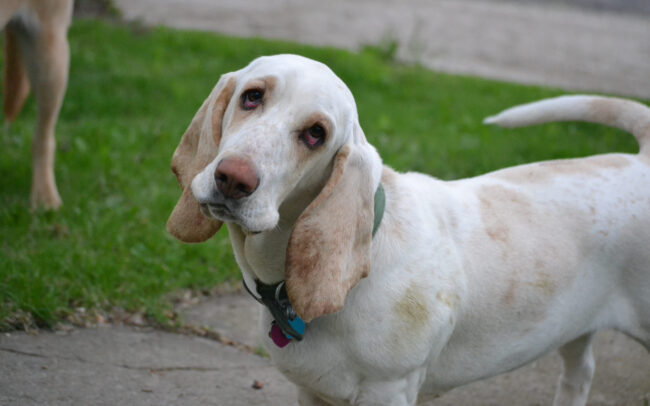Table of Contents
When you take your Basset Hound into your home, you promise to love and care for it the best way you can. However, like other breeds, Bassets are likely to be affected by some diseases and disabilities.
One of the most common problems reported by dog owners is arthritis. If you see your pooch in pain, even if there is no sign of injury, there is a chance your pet is already suffering from arthritis.
In this post, let us try to understand the problems and symptoms your Basset Hound is likely to experience if affected by arthritis. We also discuss what you can do about these issues and make your pet feel better.
Basset Hound Arthritis
Basset Hound is a friendly dog that makes a great companion for kids. These dogs have long bodies and short legs, and this shape puts a lot of stress on their back. A healthy Basset lives for about 12 years, but it is likely to develop hip dysplasia and arthritis as it grows. A dog with hip dysplasia develops arthritis due to abnormal conformation and misaligned stress points in the joints.
Arthritis in dogs is an inflammatory condition affecting the joints and is quite common. This condition limits the mobility of the joints and causes stiffness, pain and discomfort. While the Basset cannot verbally describe its pain and discomfort, it is easy to notice the stiffness of the joints. Though it is easy to ignore these signs, observing the dog’s behaviour to notice early symptoms of arthritis for timely treatment is important.
Basset Hound is a breed more likely to be affected by arthritis. The reason is that this breed belongs to a group called chondrodystrophic. These dogs are predisposed to several disorders of the joint cartilage. Bassets genetically prone to hip dysplasia will develop arthritis if they are overweight.
Basset Hound Dragging Back Legs
If your Basset Hound has difficulty moving around and walks using his front legs, it is quite upsetting. There are many reasons your dog drags its back legs. However, the most common problem in Basset Hound is arthritis and its associated pain. If you see your pet dragging its back legs, it can signify joint stiffness that restricts its motion due to joint degeneration.
As it experiences pain and discomfort in the joints, the dog reduces the use and starts dragging its legs. As the use is reduced, the arthritis symptoms increase further, and joint mobility decreases. This can result in highly restricted motion and decreased activity in the dog. If you notice these symptoms and others in your Basset, it should get tested by the vet at the earliest.
Your veterinarian looks for any abnormal bone formation, limited motion, swelling and tenderness of the joints, bone roughness and other factors as a part of a physical examination to identify the condition. Radiologic tests are often conducted to determine the type and severity of arthritis in dogs. Once analyzed, the problem can be treated with the right medications and measures available.
Basset Hound Leg Issues
Your Basset Hound has a different body structure than other breeds of dogs. Its short legs with a deformity and misalignment are likely to result in a few problems as it grows. Such deformities can also have occurred from a previous fracture that could not be healed properly with the right bone alignment. The long-term effects of such leg issues can be serious. Such dogs are more vulnerable to suffering from arthritis and related pain.
Deformities can often be corrected with surgery to reduce the stress on the joints, improve bone alignment and decrease the development of arthritis. Orthopaedic implants are used in some cases depending on the deformity type. If you notice such leg issues in your Basset Hound that cause pain or discomfort, you should consult a specialist to identify the cause and address the issue.
Different anti-inflammatory drugs are used for pain management associated with arthritis in Basset Hounds. Your vet can prescribe non-steroidal anti-inflammatory drugs that relieve pain and reduce inflammation. These medications, when combined with supplements and exercise, can alleviate the symptoms and severity of the condition in the dog over time.
Basset Hound Crooked Feet
Basset Hounds naturally have curved, short legs from their genetics. They are bred to have limb deformities. Such deformities develop in the dog’s bone when it grows, making the leg look twisted or crooked. All the Basset Hounds have outward turning feet with a purpose. Their shoulders are wide, so they need a balance mechanism for their short stature.
However, these outward turning feet abnormally strike the ground and affect the paw pads. Such limb alignment problems can lead to symptoms of arthritis in nearby joints and cause pain and even lameness. If you see crooked feet in your Basset, you can consult your vet to find out if it is affected by arthritis.
Managing the symptoms of arthritis in your Basset Hound depends on treating the underlying cause of the condition. If excessive weight is causing the issue, the veterinarian would recommend reducing the weight of the dog to reduce the pressure on the joints and thereby the inflammation. Though movement can cause pain to the dog, moderate exercises can help alleviate the pain and discomfort.
You can consider taking your Basset for a walk, swim or jog or let it go up and down the stairs to improve the motion in the joints. The pain will likely reduce when this is done with anti-inflammatory and analgesic medicines. The application of heat often reduces stiffness and relaxes the muscles. Likewise, an orthopaedic bed will help distribute the weight evenly and comfort the affected area.



